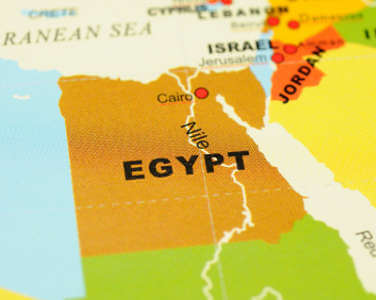
The attack started on Friday evening (March 4) in the village of Sool, located in the city of Helwan 35 kilometers (22 miles) from Cairo, and lasted through most of Saturday. A local imam, Sheik Ahmed Abu Al-Dahab, issued the call during Friday afternoon prayers, telling area Muslims to kill the Christians because they had “no right” to live in the village. The attack started several hours later.
The Rev. Hoshea Abd Al-Missieh, a parish priest who narrowly escaped death in the fire, said the clamor of the church being torn apart sounded like “hatred.”
“I was in the attack, but I can’t describe it,” he said. “The sound of the church being destroyed that I heard – I can’t describe it, how horrible it was.”
According to villagers, the mob broke into the Church of the Two Martyrs St. George and St. Mina, and as they chanted “Allahu Akbar [God is greater],” looted it, demolished the walls with sledgehammers and set a fire that burned itself out the next morning. Looters removed anything valuable, including several containers holding the remains of venerated Copts – most of whom were killed in other waves of persecution – then stomped and kicked the containers like soccer balls, witnesses said.
After the fire went out, the mob tore down what little remained of the church structure. The group of Muslims then held prayers at the site and began collecting money to build a mosque where the church building once stood, said the assistant bishop of Giza the Rev. Balamoun Youaqeem.
“They destroyed the church completely,” he said. “All that was left is a few columns and things like that. As a building, it’s all gone.”
During the fire, Al-Missieh was trapped in a house near the church building that was filling up with smoke. He faced a difficult dilemma – choke or burn to death in the house, or face an angry mob of thousands screaming for blood.
“When the smoke was too much, I told myself, ‘I am dying anyway,’ so I decided I would go out and whatever happened, happened,” Al-Missieh said.
When he went outside, a man with a rifle told the priest to follow him. At first Al-Missieh was reluctant, he said, but the man fired off two rounds from the rifle and told the crowd to step away.
“No one will touch this man, he is with me,” the priest remembered the man yelling at the mob. Al-Missieh was taken to a house where he met three other workers who were at the church when it was attacked. The men all relayed stories similar to the priest’s.
Friday’s attack was another in a long list of disproportionate responses in Egypt to a rumor of an affair between a Muslim and a Copt. Earlier this month, Sool villagers accused a Muslim woman in her 30s and a Coptic man in his 40s, both of them married, of being involved with each other. On Wednesday (March 2) a village council of Coptic and Muslim leaders convened and agreed that the man should leave the village in order to avoid sectarian violence.
The next day, the woman’s cousin killed the woman’s father in a fight about the honor of the family. The same day, the cousin died of wounds he sustained in the fight. By Friday, Al-Dahab, the local imam, had blamed the entire incident on Christians in the village and called on all Muslims in Sool to kill them.
Because of the attack, Copts in Sool fled to adjacent villages. The women who remained in the village are now being sexually assaulted, according to Youaqeem, who added that he is receiving phone calls from women in the village begging for help. Those reports have not yet been independently confirmed.
“Everybody tried to find a way to get out,” Youaqeem said.
Groups of Muslims have set up blockades around Sool, declaring they intend to turn it into an “Islamic village,” Youaqeem said.
On Sunday (March 6), roughly 2,000 people gathered outside the Radio and Television Building in Cairo to protest the attack and what Copts see as a long-standing government refusal to address or even acknowledge the persecution of Christians in Egypt. Protestors also accused the government of not sending enough troops to the village to control the situation. Holding up crosses and signs, the protestors shouted the name of Jesus and chanted, “We need our church.”
Solders armed with AK-47s with fixed-sheathed bayonets held the crowd back from the building as several priests took turns addressing the crowd. When the Giza parish priest, Bishop Anba Theodosius, said the army had pledged to rebuild the church but would not give a written guarantee of the promise, the crowd became enraged and pushed through the line of soldiers.
No one was injured in the push. More protests about the attack continued Tuesday in Cairo.
Youaqeem said the attack has devastated and enraged the Coptic community, but he sees hope.
“As they say: ‘All things work to the good of those who love the Lord,’” he said.











































